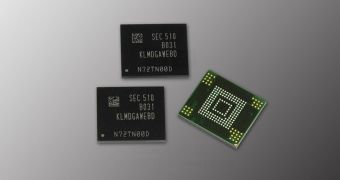Usually, when a new high-end smartphone arrives on the market, you can be fairly sure the manufacturer will offer a 128GB version. The iPhone 6 has such a variation and so does the Samsung Galaxy S6.
The trouble is that models such as these are pretty expensive and not everyone is willing to pay to have the extra storage on board.
As for cheaper handsets, they usually max out at 32GB tops. But this might change in the near future.
Samsung has identified an opportunity, so soon enough you might be able to pick up an affordable phone with 128GB of internal storage on top.
Mid-range mobile devices to get better and better
Samsung is looking to implement its new high-performance mobile memory storage based on eMMC 5.0 technology into wallet-friendly mobile devices.
Its 128GB 3-bit NAND-based chip is primarily targeted at the mid-range mobile market, which is another way of saying that the average tablet and smartphone will be taking advantage of it.
Flagships like the Galaxy S6 are currently using the more advanced and faster Universal Flash Storage of UFS 2.0 standard. So the time is right for eMMC 5.0 to be passed on to more affordable machines.
The new 128GB chip can achieve sequential data reading at up to 260 MB/s. As for random read and write operations, it can support up to 6,000 IOPS and 5,000 IOPS (input/output operations per second), respectively.
Samsung believes this is enough for advanced multi-tasking operations and high definition video processing, too.
We don't know yet when affordable 128GB smartphones will appear
An important aspect Samsung failed to mention in its press release is when it will start the mass production of the chip and when can we expect to see it embedded into phones.
Once the new technology starts making it out to OEMs across the world, we can expect to see the first affordable smartphones with 128GB of internal storage on board grace the market.
Also, we shouldn’t be all that surprised if Samsung ends up putting the technology inside some of its own smartphones and tablets. God knows, it has plenty of mid-range offerings.
With the new chip, the Korean tech giant hopes to be able to take the lead in the expansion of high-density mobile storage.

 14 DAY TRIAL //
14 DAY TRIAL //